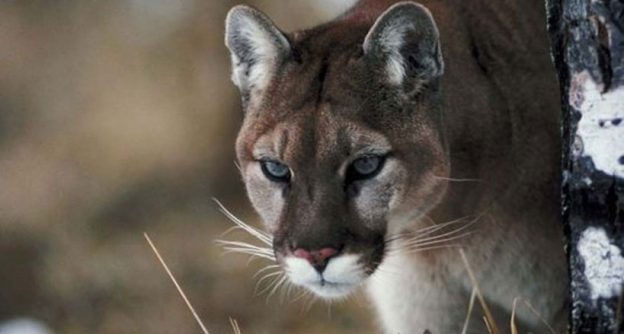By Terry Thompson, Regional Communications Manager
Friday, November 6, 2020 – 3:47 PM MST
A family dog was attacked and taken by a mountain lion east of Carey, Idaho on November 5, 2020.
Fish and Game officials received a report from a southern Idaho family that their dog was attacked and taken by what was described as a mountain lion. The reported attack occurred on Thursday evening, November 5, 2020 approximately 17 miles east of Carey, Idaho along Highway 20. The family reported visiting the Wild Rose Hot Springs which sits on private property along Highway 20. While in the hot springs with their small dogs nearby, a mountain lion grabbed a family dog. The lion took the dog, which was not found.
Anyone who chooses to access this area is encouraged to be vigilant and be aware of their surroundings, especially during early morning and evening hours. Mountain lions are typically shy animals and avoid people, but they have been known to be attracted by small animals or pets that they perceive as potential prey.
Personal safety
Wildlife managers agree that if a person is in close proximity to a lion, meaning they see it, they should:
- NEVER run away from a mountain lion. The lion’s instinct is to chase and ultimately catch what they perceive as a potential prey.
- NEVER turn your back on a lion. Always face them while making yourself look as large as you can. Yell loudly, but don’t scream. A high-pitched scream may mimic the sound of a wounded animal.
- SLOWLY back away while maintaining eye contact with the lion.
- Safety equipment you may choose to carry could include bear spray, a noise device, like an air-horn, and if you walk in the dark, a very bright flashlight.
- If you are attacked, fight back!
Remember to use all of your senses to detect if a mountain lion is near. Using a light to help you see your surroundings is very important, whether it is on trails or in your yard, or as you walk in your neighborhood. If you run or bike for personal fitness, use caution when wearing headphones which take away your ability to hear if a lion, or any other wildlife, is giving you signals that you’re too close.
Pet safety
Mountain lions are opportunistic predators, meaning they don’t know when their next meal will happen, and will often attempt to take prey when it presents itself. A lion may perceive a pet as prey. To keep pets safe, owners are strongly encouraged to follow these safety tips:
- Keep your pets on a leash.
- Watch the pets’ behavior, since they may sense the lion before you can actually see them.
Reporting mountain lion sightings and encounters
Any mountain lion incident that results in an attack should be immediately reported to the Magic Valley Regional Office at (208) 324-4359 during business hours, 8 a.m. – 5 p.m. Monday – Friday. If after hours, local conservation officers can be reached by calling the Citizens Against Poaching (CAP) hotline at 1-800-632-5999.
Mountain lion sightings and observations should be reported to the Fish and Game, Magic Valley Regional Office at (208) 324-4359.
